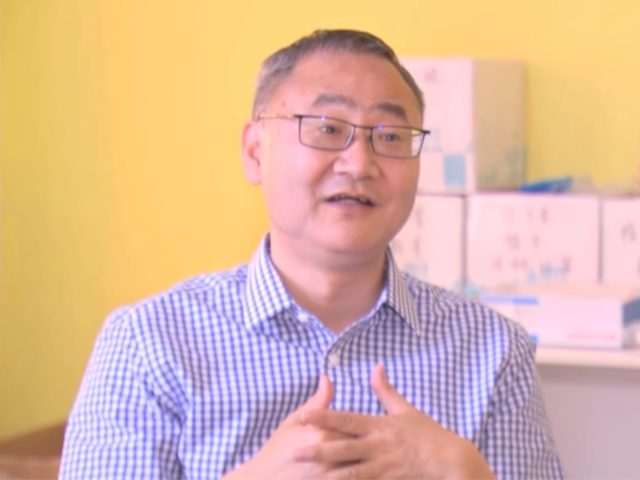At the World Health Assembly in Switzerland this weekend, the World Health Organization (W.H.O.) awarded its 2021 Sasakawa Prize to Dr. Wu Hao, head of the Fangzhuang Community Health Service Center in Beijing.
Chinese state media, and its tightly controlled social media, trumpeted the award as vindication for China’s handling of the coronavirus pandemic.
The Sasakawa Prize, established in 1984 with a grant from a Japanese health foundation, includes a statuette and $30,000 award presented for “outstanding innovative work in health development, such as the promotion of given health programmes or notable advances in primary health care, in order to encourage the further development of such work.”
W.H.O. said Dr. Wu and his health center “established epidemic prevention and control teams, and opened a 24-service hotline and WeChat official account, allowing patients to consult their family doctors for free.”
The award citation saluted Wu and his team for training some 5,000 family physicians a year and working to “ensure equal access to primary health care, especially for those living in poor areas in China.”
Chinese state television network CGTN quoted Wu responding to the award by saying, “This is not only an award for me. It’s also for everyone who helped safeguarding the fairness in access to basic health services across China.”
CGTN proceed to burnish Wu’s Chinese Communist Party (CCP) credentials and present him as a symbol of China’s response to the Wuhan coronavirus outbreak:
“He is among those who reinforced Wuhan. My respect to all of them,” read a Weibo comment.
Also a member of the National Committee of the Chinese People’s Political Consultative Conference, Wu regularly proposed practical advice to the government about how to run better community health services, especially how to protect and ensure equal access to health care in poor areas.
[…]
In addition, Wu also went to Wuhan in the early days of the COVID-19 outbreak and helped fight against the pandemic as a leading expert on community-level disease control. According to Beijing News, Wu had almost no vacations in 2020 in order to deal with COVID-19. “It’s my job to join this long-term combat against the pandemic. I’m ready to work at any time,” he said in March 2020.
CGTN noted that Wu was named by the Chinese government as “one of the 1,499 role models in China’s fight against the Covid-19 [Chinese coronavirus] epidemic on September 8, 2020.”
China’s state-run Global Times noted on Sunday that “Wu is the third Chinese person to win the prize, after Dr. Niu Dongping in 1989 and Dr. Du Xueping in 2010.”
The Global Times said Wu’s health center has been a leading innovator in using artificial intelligence technology (AI) to process patient data and allocate medical staff to rural areas:
The AI technology he mentioned is a “smart system” that integrates elements like electronic patient health records, feedback from wearable devices that measure vital information such as blood pressure and the use of mobile apps and text messaging and links up other relevant institutions for referrals.
This enables doctors to remotely assess and monitor patients, rank patient conditions, flag priority patients and send reminders and relevant information.
According to the WHO, in the 11 years that Wu has headed the center, its outpatient volume has soared from fewer than 110,000 to 440,000 today. The center, which has just 25 general practitioners and a team of nurses, has transformed the way community health is practiced in the capital region, especially in the management of chronic diseases like hypertension and diabetes.
The Global Times said Wu traveled to Wuhan in early February 2020 and became well-known for his work there, visiting hundreds of communities and submitting almost a thousand suggestions for controlling the epidemic.
“The problems were that local communities did not lock down, their daily waste was not treated in a scientific way, the control measures were not reasonable and the investigation was not complete,” Wu said of his time in Wuhan.
W.H.O. was criticized throughout much of 2020 for accepting false information about the coronavirus from China and refusing to criticize Beijing for transmitting the disease beyond China’s borders. Former President Donald Trump was especially outspoken in criticizing W.H.O. on these terms.
“China has total control over the World Health Organization despite only paying $40 million per year compared to what the United States has been paying which is approximately $450 million a year,” Trump said in May 2020 when he withdrew U.S. support for the organization.
W.H.O. belatedly grew somewhat critical of China in 2021, when Chinese officials were reluctant to allow W.H.O. investigators to visit Wuhan. When a W.H.O. team was eventually allowed to visit Wuhan in late January, critics said the “investigation” was a sham micro-managed by CCP officials and blasted the Chinese government for refusing to provide vital raw data to the international team.
The W.H.O. report from Wuhan has become a topic of great controversy and something of an embarrassment for the organization, which found itself backpedaling from the report soon after it was released in March.
Questions about the report’s inconsistencies and omissions, combined with shifting political priorities in U.S. media after the end of the Trump administration, prompted a recent resurgence of interest in the “lab leak” hypothesis of the pandemic’s origin. The Chinese government will surely use its W.H.O. award to insulate itself from criticism and bolster its narrative that Chinese policies were not the cause of the pandemic, but rather the most effective response to it.

COMMENTS
Please let us know if you're having issues with commenting.